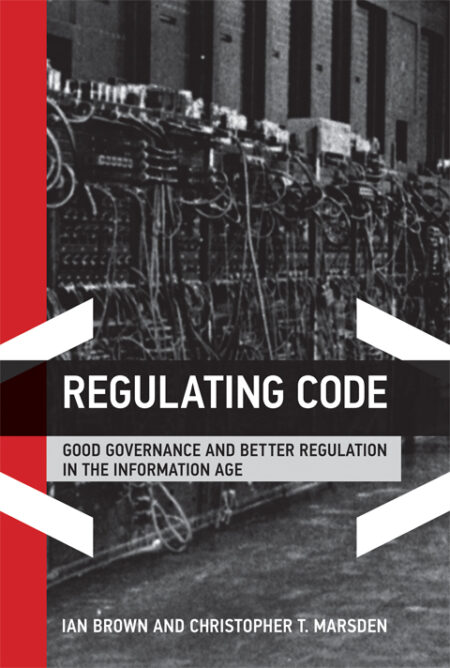
Professor Ian Brown
Former Research Fellow
Professor Ian Brown was Professor of Information Security and Privacy at the OII. His research is focused on surveillance, privacy-enhancing technologies, and Internet regulation.

Internet use has become ubiquitous in the past two decades, but governments, legislators, and their regulatory agencies have struggled to keep up with the rapidly changing Internet technologies and uses. In this groundbreaking collaboration, regulatory lawyer Christopher Marsden and computer scientist Ian Brown analyze the regulatory shaping of “code”—the technological environment of the Internet—to achieve more economically efficient and socially just regulation. They examine five “hard cases” that illustrate the regulatory crisis: privacy and data protection; copyright and creativity incentives; censorship; social networks and user-generated content; and net neutrality.
The authors describe the increasing “multistakeholderization” of Internet governance, in which user groups argue for representation in the closed business-government dialogue, seeking to bring in both rights-based and technologically expert perspectives. Brown and Marsden draw out lessons for better future regulation from the regulatory and interoperability failures illustrated by the five cases. They conclude that governments, users, and better functioning markets need a smarter “prosumer law” approach. Prosumer law would be designed to enhance the competitive production of public goods, including innovation, public safety, and fundamental democratic rights.
Ian Brown is Professor of Information Security and Privacy at Oxford University’s Oxford Internet Institute. He is the editor of the Research Handbook on Governance of the Internet.
Christopher T. Marsden is Professor of Law at the University of Sussex school of Law. He is the author ofNet Neutrality: Towards a Co-Regulatory Solution, Internet Co-Regulation, and three other books.
“Regulating Code provides an excellent contribution to the scholarly literature and an invaluable resource for policy-makers who need to understand the key elements of a forward-looking public policy agenda for the internet age, as well as for other stakeholders participating in the deliberative process.”—International Journal of Law and Information Technology
“Overall, the book is a great addition to the literature (especially the geopolitics of information context) and is of value for a variety of audiences interested in this field, including students, academics, researchers, ICT theorists, policy makers, decision makers and IT managers.”—Online Information Review
“Ian Brown and Christopher Marsden have adopted a clear-eyed, multidisciplinary approach to Internet governance and regulation, which they employ successfully to tackle some of the most challenging public policy issues of the day in their so-called five ‘hard cases.’ By hard-wiring interoperability, transparency, and standards-setting into a coherent framework, they have rescued user rights from potential irrelevancy and paved the way for a more holistic understanding of Internet regulation.”
—Richard Whitt, Global Head of Public Policy and Government Relations, Motorola Mobility LLC
“Regulating Code is the best single resource on the contemporary global landscape of Internet regulation. By examining how both governmental and private measures interact with the Internet’s technical code, Brown and Marsden show how the Internet is disrupting and potentially reformulating the very notion of regulation. A rare book about the Internet that is equally sophisticated in its analysis of law, technology, and political economy.”
—Kevin Werbach, Associate Professor of Legal Studies and Business Ethics, Wharton School, University of Pennsylvania